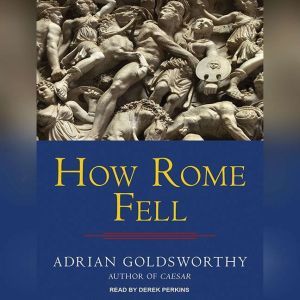

How Rome Fell
Death of a Superpower
Author: Adrian Goldsworthy
Narrator: Derek Perkins
Unabridged: 18 hr 28 min
Format: Digital Audiobook Download
Publisher: Tantor Media
Published: 12/30/2014
Categories: Nonfiction, History, Ancient History, Roman History
Synopsis
This was a period of remarkable personalities, from the philosopher-emperor Marcus Aurelius to emperors like Diocletian, who portrayed themselves as tough, even brutal, soldiers. It was a time of revolutionary ideas, especially in religion, as Christianity went from persecuted sect to the religion of state and emperors. Ultimately, this is the story of how an empire without a serious rival rotted from within, its rulers and institutions putting short-term ambition and personal survival over the greater good of the state.


